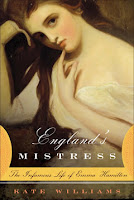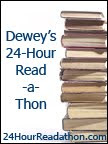 Not being an Emma Hamilton scholar, or having access to the original documents Kate Williams used to write her book I’m unequipped to judge her book on a historian’s terms. Maybe she’s got it all terribly wrong and other readers will come and scoff at my naive enthusiasm for her book. I hope not because I’m a new adoring fan of the Emma that Kate Williams has presented in ‘England’s Mistress: The Infamous Life of Emma Hamilton’ (and because I don't like the word scoffing).
Not being an Emma Hamilton scholar, or having access to the original documents Kate Williams used to write her book I’m unequipped to judge her book on a historian’s terms. Maybe she’s got it all terribly wrong and other readers will come and scoff at my naive enthusiasm for her book. I hope not because I’m a new adoring fan of the Emma that Kate Williams has presented in ‘England’s Mistress: The Infamous Life of Emma Hamilton’ (and because I don't like the word scoffing).Everyone knows Emma as the dazzling mistress of Admiral Horatio Nelson, but before she began her association with him she had played many roles. She grew up in the midst of a poor family, supported by women and throughout her early life she earned her living as a maid, a dancer, an artist’s model and a prostitute. The last profession dropped her into the life of Harry Featherstonehaugh who fathered her first child and then cast her off. In trouble Emma turned to the dullest, yet most dependable member of Harry’s set Charles Greville and became his mistress. Later, eager to marry and improve his financial standing Greville palmed Emma off on his uncle, William Hamilton, the British envoy to Naples. Greville tricked her into making the trip to Naples by pretending she would just be visiting on holiday – classy or what. Emma and William’s arrangement grew into a devoted, faithful relationship and Emma secured a marriage with her respectable older lover, making her Lady Hamilton. Her journey from poverty to splendour and then unfortunately back to poverty at the end of her life sounds interesting when only the plain facts are laid out. With a skilled writer able enliven her story and the historical period with all the relevant details Emma’s story becomes an engrossing tale.
As I said above I’ve really got no background knowledge that I can use to judge the accuracy of William’s interpretation of Emma’s life, but I can talk about the way the book is written. I think Williams understands her audience much better than many writers of historical non-fiction and that doesn’t mean she dumbs down her book. ‘England’s Mistress’ is laid out in short chapters, which helps to lift the pace of the narrative and combats the problem of a reader’s wandering attention span (I don’t know about you but personally I find non-fiction harder to concentrate on than novels). Her sentences are varied in length and the prose style consists of a fluid main narrative that continues to be alluded to, even as Williams diverges from the main characters to provide information on more general matters. As she ties Emma and her companions in with the details of the society, or history the author keeps the action progressing and this keeps the reader’s attention. The writing style feels natural, current and deft, avoiding the clunky turns of phrase or archaic word choice that seemed to clutter so many of the contemporary sources we read at university.
One history theory bit: a reviewer on Amazon mentions that much of Emma’s early life is largely constructed from assumptions, based on other poor families whose lives were recorded or the normalities of the period. That bothered me a bit at the beginning until I used my slightly rusty historical skills and realised that because Emma’s parents were illiterate they would have left few records behind and because no one would have expected Emma to become famous, as she was a female child born in poverty, no one was likely to be keeping detailed records of her life. You can argue that Williams should have started her investigation of Emma from the point in her life where definite facts became more available, but working with narrative history (especially commercial narrative history) demands that you tell a story. I think Williams made the right choice when it came to the interests of her readers and also craftily, uses these assumptions to persuading readers that Emma is a heroine worth supporting. Without a look into what her early life was like and an active involvement with Emma readers might have been less sympathetic about her later actions (like taking up with a married man).
Personally I had a bigger problem with the psychological suppositions made about how an event might have affected Emma’s developing character. However, that’s an old prejudice set up by a history teacher while I was in college and again I think those kind of guesses help William’s to win readers to Emma’s cause.
By the end of this book I felt passionately involved with Emma’s life. I cared about her and I was angry when the men in her life, so unconventional when it came to affairs of the heart proved so conventional when it came to financial matters. Both Hamilton and Nelson knew the extent of Emma’s debts, but they left her insufficiently provided for and at the end of this history, the despair and deception that makes up the end of Emma’s life felt tangible, as if it was being recreated right in front of me. It’s a special writer who can make a historical character feel not only relevant, but truly real to a modern reader.
Now for some fun historical facts learned from this book:
When Emma became a fashion leader her simple style of loose white satin gowns, satin slippers and free flowing hair freed women from the impractical fashions of the day, such as hoop skirts and hairstyles piled high with ornaments.
False eyebrows were made from mouse fur!
Jane Austen was not a fan of Emma. She used Emma’s signature turban to signal affected female characters. Jane was more on the side of Nelson’s wife, Fanny and honestly as much as I loved Emma I felt terrible for Fanny. She was disliked by her husband because she was barren, quiet, not quite as wealthy as her guardian made out and unwilling to play to the crowds.
I just found out that Kate Williams has a second book ‘Becoming Queen’ about Victoria – which now goes straight on to my wish list.
Tags:
